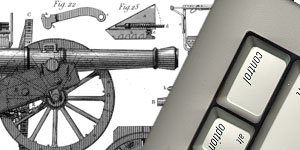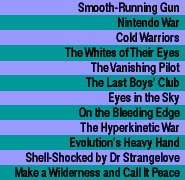


Evolution's Heavy Hand
Like a schoolyard fistfight, warmaking depends on six things: speed (how fast you can hit), strength (how hard you can hit), scope (how far you can hit), stamina (how long you can hit), stealth (how sneakily you can hit), and selectivity (how well you can hit). Intangibles like leadership, morale, and training are important too, but only insofar as they affect the other factors. Terrain, climate, and weather also affect wars, but they aren't (yet) under our control.For thousands of years these six factors changed only gradually. In the present century, however, there have been three revolutions in technology and, so, three revolutions in warmaking.
The first came in the 1920s and 1930s when internal combustion engines, portable radios, and planes replaced horses and messengers and added a new dimension to war. Before then forage for the horses exceeded the amount of food and ammunition an army carried and armies fought no faster than they did during the days of the Roman Empire. After mechanization, the speed that units could advance leapt up, as did the depth to which they could penetrate while still keeping in touch with each other. Both the speed and scope of war picked up.
The second revolution occurred in the 1940s and 1950s, when long-distance communication and sensing technologies like radar and telephones and mass weapons like ballistic missiles and nuclear weapons made war strategic and up to the minute. It then became possible to quickly bring overwhelming firepower down on a distant enemy. War could be intercontinental. And it could be over in a matter of minutes.
In the Second World War, the scope of war was maximized, because armies could finally hit whole national populations. At the same time, warfare stamina was maximized by mobilizing entire populations. Strength also reached its maximum---at least until we develop planet-destroying bombs or nation-destroying biological weapons. And with the development of nuclear submarines, speed also reached its maximum---until we orbit high-energy lasers or plant satchel nuclear weapons in the enemy's cities.
The third revolution started in the 1970s and 1980s as computers grew good enough and cheap enough to start replacing us, and enhancing communications, long-distance sensors, weapons, logistics, and just about everything else about war. Computers also revolutionized design and testing, thereby adding, for example, stealth planes, missiles, and ships to the only previously known stealth craft---the submarine. The selectivity and stealth of warfare both leapt up, and weapons started, in a rudimentary way, to think for themselves. That third revolution had, and will have, many consequences.
First, cruise missiles and other smart weapons have become the new timekeepers of war. Their stealth, precision, high cost, and the long time needed to manufacture them, are making wars briefer, more expensive, more frenetic, and more ferocious. The carnage now starts with the smart weapons destroying each other, leaving the older technologies to fight to the end. Wars are quickly being decided by who can field more and smarter armaments at the beginning of the war since there is no longer enough time for any but a few nations to build new ones in time to use them. For example, Argentina's attacks on British ships soon petered out during the 1982 Falklands War because it had only five French Exocet missiles at the start of the war. Even so, those few missiles destroyed two major British ships. Iraq had a similar experience with its relatively small supply of Russian Scud missiles during the 1991 Gulf War.
Second, advanced nations, who can make and improve smart weapons easily, polevaulted ahead of other countries. On the other hand, compared to nuclear weapons, these devices are often smaller and cheaper and need less maintenance. So developing nations can buy and use them even if they can't make them.
Third, buying rather than making smart weaponry means buying a two-edged sword. Thanks to the immense complexity of the computers controlling them, it's now possible for weapons sellers to program invisible safeguards into their weapons' and sensors' software so that they can't be used against the seller's nations. Buyers might only become aware of these failsafes when they go to war and watch their expensive equipment blow up.
Fourth, as the target selectivity of smart weapons improves, the value of tactical nuclear weapons decreases, since precision weapons can now be just as effective. There's no point nuking masses of tanks or ships when conventional weapons are selective enough and cheap enough to do the job. High explosives are cheaper and safer than nuclear weapons, both militarily and politically.
Finally, the greatest change in war in the past few decades has been the speed of improvement in machine competence. Because computers now control everything in sight, a weapon's usefulness is determined not just by its physical characteristics, but also by the capabilities of its computer programs. Immaterial computer programs inside weapons are far easier to change than the weapons themselves. For example, today's Patriot missile is essentially the same as it was in the 1980s, but its software has been significantly enhanced. Even during the short Gulf War, it went through three upgrades.
The shift toward software development will drastically change wea- pons deployment and enhancement cycles. It used to take ten to fifteen years for anything to really change on the battlefield, simply because a decade or more was needed to design, prototype, manufacture, and deploy new weapons. Now that time can sometimes be cut to a year or less---in extreme cases to a few months---because the hardware isn't changing---the software is.
Now that troops carry their computers to war with them, weapons enhancement can even happen on the battlefield. That enormous change will give the edge to the most technologically adaptable nation, will put advanced nations even further ahead of developing nations, and will drive all nations to improve their technological prowess. All these changes will destabilize present power structures and perhaps make future war more likely. War, already brutal, may soon become as tender as an ice pick.